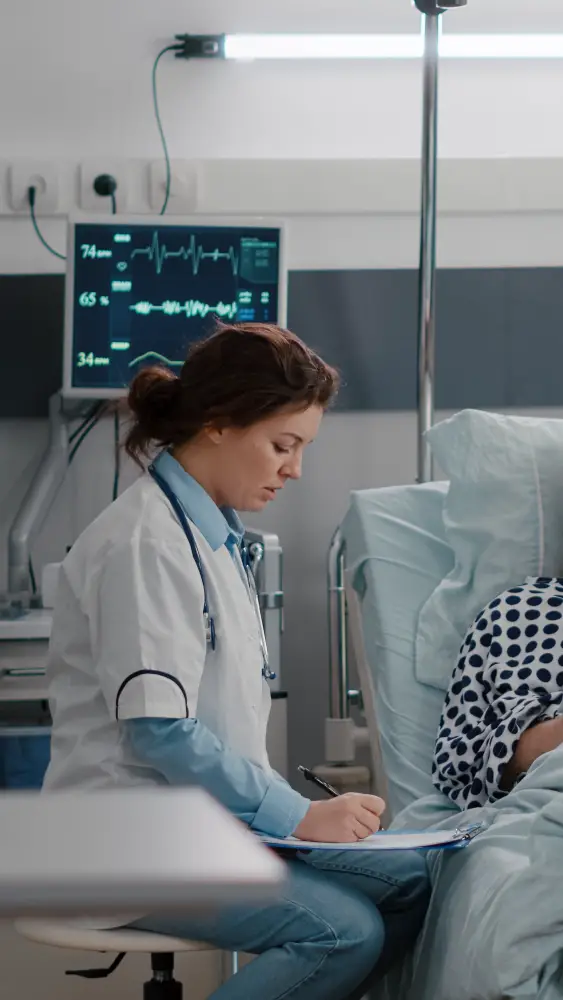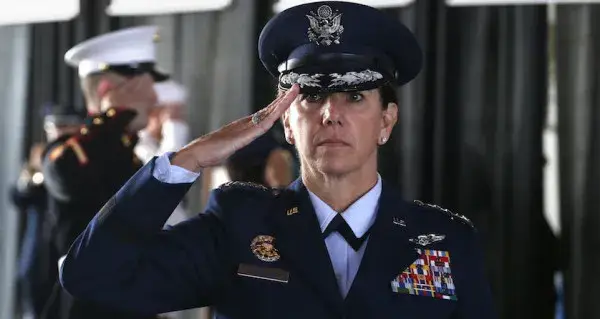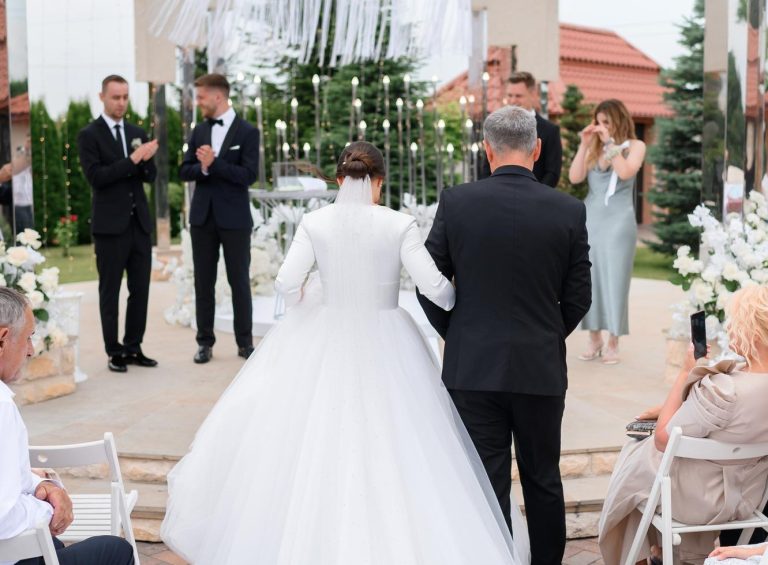The Biker Who Walked Into My Mother’s Hospice Room
The Stranger at the Door
The biker walked into my mother’s hospice room at 2 PM on a Thursday, and my hand immediately reached for the call button.
This wasn’t just any visitor. This was a mountain of a man, easily six-foot-four and 250 pounds, covered in tattoos that snaked up his arms and disappeared beneath a weathered leather vest. His gray beard hung long and wild, and patches decorated his vest like battle scars. “Guardians MC” blazed across his back in bold letters. An American flag. A Purple Heart. Symbols I couldn’t begin to decode.
He looked like every warning about motorcycle gangs I’d ever seen on the evening news. And he was standing in the doorway of my eighty-seven-year-old mother’s room, uninvited, during her final days on earth.
I was on my feet before I even realized I’d moved. “Excuse me,” I said, my voice sharp with protective fury. “This is a private room. You need to leave. Now.”
He stopped, his massive frame filling the doorway, blocking out the fluorescent light from the hallway. “I’m sorry, ma’am,” he said, his voice surprisingly soft. “I know this looks strange. But I need to see Dorothy Chen. It’s important.”
“My mother isn’t accepting visitors,” I replied, positioning myself between him and her bed. “I don’t know who you are or how you got this room number, but you need to leave immediately, or I’m calling security.”
My finger hovered over the call button. In my mind, I was already composing the complaint. How did security let this man past the front desk? What kind of hospice allowed dangerous-looking strangers to wander into patients’ rooms?
Then my mother’s eyes opened.
She hadn’t been conscious in two days. The doctors had warned me she probably wouldn’t wake again. The morphine had pulled her deep into that twilight space between this world and whatever comes next. But her eyes opened now, clear and focused in a way I hadn’t seen in weeks.
She looked directly at the biker, and whispered one word that stopped my heart.
“Johnny?”
The Name I’d Never Heard
The transformation in the biker was instantaneous and devastating. This huge, intimidating man, this stranger who looked like he could tear down walls with his bare hands, crumbled before my eyes. Tears began streaming down his weathered cheeks, disappearing into his gray beard.
He moved toward my mother’s bedside with a gentleness that seemed impossible for someone his size. When he took her frail, papery hand in his massive, scarred ones, it was as though he was holding the most precious thing in the world.
“No, ma’am,” he said, his voice breaking. “I’m not Johnny. But Johnny sent me.”
My mother started crying. Real tears, the first genuine emotion I’d seen from her in days. The biker cried too, standing there beside her bed, holding her hand like she was made of glass.
And I stood frozen in the middle of the room, my finger still hovering over the call button, having absolutely no idea who Johnny was or why this terrifying-looking stranger was bringing my dying mother to tears.
“He found me?” Mom whispered, her voice trembling with something between hope and heartbreak. “After all this time?”
“Yes, ma’am,” the biker said gently. “After all this time. He never stopped looking.”
I felt like I’d stepped into someone else’s story. Someone else’s life. Because the woman in that bed, the woman I’d known for sixty-one years, had never mentioned anyone named Johnny. Not once. Not ever.
My mother was Dorothy Chen, retired librarian, widow of fifteen years, a proper woman who wore pearls to church every Sunday and kept her house spotless and her past locked away. She’d raised me alone after my father died when I was twelve. She was dignified. Reserved. Quiet about everything that came before.
I’d thought it was grief. I’d thought she’d closed off that part of her life after losing Dad.
I had no idea she was guarding a secret that had lasted sixty-three years.
The Envelope
“Johnny wanted to come himself, ma’am,” the biker continued, still holding my mother’s hand. “He tried so hard to get here. But he passed away three months ago. Heart attack. It was quick, peaceful. But before he died, he made me promise to find you. To tell you he never forgot. To tell you he looked for you for sixty years.”
My mother’s face contorted with grief. “He’s gone? Johnny’s really gone?”
“Yes, ma’am. I’m so sorry. But he left something for you. He made me swear I’d put it in your hands before you passed.”
The biker reached into his vest with his free hand and pulled out an envelope. It was old, yellowed with age, sealed with red wax that had cracked over the years. He placed it carefully in my mother’s trembling hands.
“What is this?” I asked, my voice barely above a whisper. “Who was Johnny? Mom, I don’t understand.”
She turned her head toward me, and in her eyes, I saw decades of pain I’d never known existed. “Catherine,” she said, her voice weak but determined. “Sit down, sweetheart. I need to tell you something I should have told you forty years ago.”
The biker started to leave, to give us privacy, but Mom grabbed his wrist with surprising strength. “Stay,” she said. “Please. I want you to hear this too. I want someone who knew Johnny to know the whole truth.”
So this stranger sat down in the plastic chair next to my mother’s deathbed, still holding her hand, while she told me a story that shattered everything I thought I knew about her life.
The Girl She Used to Be
“In 1957, I was Dorothy Kim,” my mother began, her voice drifting between present and past. “I was nineteen years old, living in San Francisco with my parents. This was twelve years after World War II ended, when being Asian in America meant facing suspicion everywhere you went. My parents ran a small grocery store in Japantown. I was studying to be a teacher.”
She paused, gathering strength. “And I fell in love with Johnny Martinez. He was twenty years old, Mexican American, and he rode motorcycles.”
I felt my world tilt. My mother, the woman who alphabetized her spice rack and ironed her pillowcases, had been in love with a motorcycle rider?
“Your grandparents forbade it,” she continued. “In their eyes, Johnny was everything wrong. He wasn’t Korean. He wasn’t educated. He wasn’t respectable. He rode motorcycles with other boys who looked dangerous. He wore leather jackets and worked as a mechanic instead of going to college.”
“But Johnny was the kindest person I’d ever met. He was gentle and funny and he treated me like I was precious. He’d pick me up after my classes and we’d ride through Golden Gate Park. We’d go to diners where nobody knew us and we could just be ourselves, just be together.”
The tears were flowing freely now, sixty-three years of suppressed emotion pouring out. “We planned to run away together. June 15th, 1960. We were going to ride to Nevada, get married, start over somewhere fresh. Johnny had a job lined up in Denver. I had my teaching certificate. We thought we could make it work.”
My mother’s hand tightened around the envelope. “But three days before we were supposed to leave, my parents found out. They found his letters. They found the tickets I’d hidden in my room. And they gave me an ultimatum.”
“They said if I ran away with Johnny, I was dead to them. Your aunt, my younger sister, was about to start college. They said if I disgraced the family, they’d pull her out of school. She’d lose her scholarship. Her entire future would be destroyed because of my selfishness.”
Her voice broke completely. “I was nineteen years old, Catherine. They made me choose between the person I loved and my sister’s future. So I chose my sister. I broke Johnny’s heart to save her life.”
The Betrayal That Saved a Life
The biker was crying silently now, tears streaming into his beard. He seemed to understand something I was still struggling to grasp.
“I went to the bus station on June 15th, 1960,” Mom continued. “Johnny was there with his motorcycle, with our bags packed, with the biggest smile on his face. He thought we were finally running away together. He thought our life was about to begin.”
“And I told him I couldn’t go. I told him my parents were right, that we were from different worlds, that it would never work between us.”
She closed her eyes, and I knew what was coming next was the worst part.
“I told him I didn’t love him. That was the lie that destroyed us both.”
“Johnny begged me to change my mind,” she whispered. “He said he’d wait for me. He said he’d prove himself to my parents. He said he’d do anything, become anyone, just so we could be together. But I turned away from him, and I walked home, and I never saw him again.”
I sat there, watching my mother relive a moment from sixty-three years ago with the same fresh pain as if it had happened yesterday. This was the secret she’d carried. This was the weight she’d borne in silence.
“Three months later,” she said, “my parents arranged my marriage to your father. Winston Chen. He was respectable, educated, from a good Chinese family. I was married by November 1960. You were born in 1963. I built a life that looked perfect from the outside.”
“But I never stopped loving Johnny Martinez. Not for one single day in sixty-three years.”
The Man Who Never Stopped Searching
The biker cleared his throat, drawing our attention. “Ma’am,” he said gently to my mother. “Johnny never stopped loving you either. That’s why he spent sixty years looking for you.”
He told us Johnny’s story then, painting a picture of a man I’d never met but was beginning to understand.
After Dorothy broke his heart, Johnny left San Francisco. He couldn’t bear to stay in the city where every street corner held memories of her. He joined the Marines, desperate for purpose, for direction, for anything to fill the void she’d left. He served two tours in Vietnam, came home decorated and broken, carrying wounds both visible and invisible.
He became a mechanic in San Diego, built a quiet life. He married eventually, had children, got divorced. He went through the motions of living, but he never talked about Dorothy Kim to anyone. He kept her letters in a box in his garage and read them when he thought nobody was watching.
“But he never stopped searching,” the biker said. “Every few years, he’d try again. He’d look for Dorothy Kim in San Francisco. He’d call Korean churches, check city directories, hire private investigators when he could afford it. But your mother’s name changed when she married. The trail always went cold.”
“Then three years ago, Johnny joined our motorcycle club. Guardians MC. We’re a veteran’s club, men who served our country and came home needing brotherhood, needing family. Johnny was seventy-nine years old when he joined us. Oldest prospect we ever had.”
The biker smiled through his tears. “He told me about you one night, ma’am. We were on a ride through the mountains, stopped at this overlook to watch the sunset. Beautiful view, peaceful. And Johnny started talking about a girl he’d loved in 1960. The girl he never got over, never forgot, never stopped searching for.”
“He asked me to help him find you. Said it was his last wish, to know what happened to you, to know if you were okay. So I did what I do. I’m good with computers, good with research. Started digging.”
The Search That Ended in Heartbreak
“It took me six months,” the biker continued, “but I found a Dorothy Kim who married Winston Chen in San Francisco in November 1960. Found the marriage certificate. Found a daughter named Catherine. Found that Winston Chen died in 2008 and his widow Dorothy moved to Portland to be near her daughter.”
“I called Johnny with the news on February 14th this year. Valentine’s Day. Told him I’d found his Dorothy after sixty years. I had your address, your daughter’s phone number. Told him he could call you, write you, visit you. After six decades of searching, I’d finally found his lost love.”
The biker’s voice cracked, and I saw his hands tremble. “Johnny had a massive heart attack that night, ma’am. Died before the ambulance arrived. Doctors said it was quick, that he didn’t suffer. But I think his heart just couldn’t take it. Sixty years of searching, and he found you just in time to die.”
My mother let out a sound I’d never heard before, a keening wail of grief that seemed to come from the depths of her soul. “He died thinking of me?”
“Yes, ma’am,” the biker said softly. “His last words to me were ‘Find her. Tell her I never forgot. Give her the letter.’ He made me promise I’d reach you before you passed, that you’d know he understood, that he forgave you, that he never stopped loving you.”
He gestured to the envelope still clutched in my mother’s hands. “He wrote you a letter every year on June 15th. The anniversary of the day you were supposed to run away together. Sixty-three letters, ma’am. He never mailed them because he didn’t know where you were. But he wrote them anyway, every single year.”
Sixty-Three Years of Love Letters
My mother’s hands shook as she tried to open the envelope. The biker helped her, carefully breaking the ancient wax seal. Inside were dozens of letters, each one dated June 15th, spanning from 1960 to 2023.
She pulled out the first one with trembling fingers. The date read June 15th, 1960. Just three days after she’d broken his heart at that bus station.
The biker read it aloud, his voice gentle:
“Dear Dorothy, It’s been three days since the bus station. I still can’t believe you didn’t love me. I saw your face. I saw your tears. Something happened, something you’re not telling me. Someday I’ll find out what. Someday I’ll find you again and you’ll tell me the truth. Until then, I’ll wait. I’ll keep riding. I’ll keep hoping. You’re the only girl I’ll ever love. Happy anniversary of the day we almost ran away together. Love, Johnny.”
He read the second letter, dated June 15th, 1961:
“Dear Dorothy, I’m in Vietnam now. Joined the Marines because I couldn’t stay in San Francisco without you. I think about you every day. Wonder if you’re happy, if you think about me, if you ever regret what happened. I hope you’re safe. I hope you’re loved. I hope someday I’ll see you again. Happy anniversary. Love, Johnny.”
Letter after letter, year after year, the biker read Johnny’s life in his own words. His marriage. His children. His divorce. His struggles with PTSD. His work as a mechanic. His endless, tireless search for the girl he’d lost.
Every letter ended the same way: “Happy anniversary of the day we almost ran away together. Love, Johnny.”
By the time we reached the final letter, dated June 15th, 2023, all three of us were sobbing.
“Dear Dorothy, I’m seventy-nine years old today. Joined a motorcycle club last year, old guys like me who still love to ride. My friend Diego is helping me find you. He’s close, I can feel it. Maybe this year will be the year I finally see you again. Maybe this year I’ll tell you that I understand why you couldn’t leave, that I forgive you, that I never blamed you. Or maybe I’ll die still loving you from a distance. Either way, I want you to know you were the best thing that ever happened to me. You were the love of my life. Every mile I rode, I rode toward you. Every sunset I saw, I wished you were seeing it too. If you’re reading this, it means Diego found you. It means you know I never stopped looking. It means you know I never stopped loving you. Happy anniversary, my Dorothy. I hope you had a beautiful life. I hope you were happy. I hope you knew, somehow, that you were loved. Always, Johnny.”
The Final Hours
My mother held that last letter against her chest, tears streaming down her face. “He forgave me,” she whispered. “He understood.”
“Yes, ma’am,” the biker, Diego, said. “He made me swear I’d tell you. Said you shouldn’t carry guilt into whatever comes next. Said what you did was an act of love, sacrificing your happiness for your sister. That’s the kind of woman you were. That’s why he loved you.”
“He wanted you to know he had a good life. Not the life he wanted, but a good one. He had kids he loved, friends, his motorcycle, his club brothers. And he had the memory of you, which kept him going for sixty years.”
My mother looked at me with eyes full of decades of hidden pain. “I’m sorry I never told you, Catherine. I’m sorry you didn’t know about him.”
I took her other hand, holding it tight. “It’s okay, Mom. I understand.”
But I didn’t, not really. Not yet. I was still trying to process that my quiet, proper mother had loved a motorcycle rider for her entire life. That somewhere in the world, a man I’d never met had spent sixty years searching for her.
For the next four hours, Diego told us about Johnny Martinez. He showed us photos on his phone. Johnny at eighty, still riding a Harley, gray hair in a ponytail, smile radiant. Johnny with his grandchildren. Johnny in his garage. Johnny with his club brothers, surrounded by men who loved him.
He told us about Johnny’s charity work, how he’d fix cars for free for single mothers and struggling families. How he’d taught kids from rough neighborhoods to be mechanics, giving them skills and hope. How he’d mentored young veterans coming home from war, helping them adjust, saving them from the darkness.
“Johnny saved my life,” Diego said quietly. “I came home from Iraq in 2015 with PTSD and addiction and no idea how to live anymore. Johnny took me in, got me sober, taught me to work on bikes, helped me find purpose. That’s who he was. That’s what he did for people.”
My mother smiled through her tears. “Tell me he was happy. Please tell me he had real happiness.”
“Yes, ma’am. I promise. Lots of it.”
Mom died six hours after Diego arrived. She drifted off peacefully around 8 PM, still holding Johnny’s letters, Diego still holding her hand. Her last words, whispered so softly I almost missed them, were “Tell Johnny I’m coming.”
The Promise Kept
Diego stayed with us through everything. He held Mom’s hand while I called the nurse. He said a prayer in Spanish that I didn’t understand but felt in my bones. He helped me gather her belongings and make the impossible phone calls.
Before he left, I had to ask. “Why did you do this? You didn’t know my mother. You barely knew Johnny for three years. Why spend months tracking down a stranger to keep a promise to a man who’d already died?”
Diego’s eyes, which had seemed so intimidating when he first walked in, now looked infinitely gentle. “Ma’am, Johnny saved my life. When I came home from Iraq, I was three days away from eating a bullet. Had the gun loaded. Had the note written. Johnny showed up at my apartment because someone at the VA told him there was a young veteran who needed help.”
“He took me to his garage, put me to work on an engine. Didn’t talk about feelings or therapy. Just worked alongside me, let me exist without judgment. Did that every day for three months until I started to feel human again.”
“When he asked me to find Dorothy, he said ‘Brother, I know what it’s like to live with regret. I’ve carried it for sixty years. I don’t want Dorothy to die carrying that same weight. Promise me you’ll find her. Promise me you’ll tell her she was loved.’”
Diego’s voice cracked. “So I promised. And when Johnny died, I promised again at his funeral. I spent three months searching. When I finally found your mother and the hospice told me she had days left, I got on my bike and rode nine hours straight through the night from San Diego.”
“That’s what we do, ma’am. We keep our promises. We honor our brothers. We don’t leave people behind.”
I hugged this stranger, this huge tattooed biker who’d ridden through the night to bring peace to a dying woman he’d never met. “Thank you,” I whispered. “Thank you for this gift.”
“It was an honor.”
The Truth About Assumptions
We buried Mom two weeks later with Johnny’s letters in her hands. Diego rode up from San Diego for the funeral, along with twenty other members of Guardians MC. They stood in the back of the church in their leather vests, these huge intimidating men, and they cried through the entire service.
At the cemetery, Diego gave a eulogy that changed how I see the world.
“I didn’t know Dorothy Chen,” he said. “But I knew the man who loved her. Johnny Martinez spent sixty years looking for this woman, never giving up, never stopping believing he’d see her again. Some might say that’s sad, that he wasted his life. But Johnny’s love for Dorothy made him a better man. It kept him soft in a world that tried to make him hard. It kept him believing in happy endings even when his own seemed finished.”
The bikers revved their engines in salute. It was the most beautiful, heartbreaking sound I’d ever heard.
I think about that day constantly. The day I almost called security on Diego. The day I almost threw out a “dangerous biker” who turned out to be an angel keeping a sacred promise.
I think about all the assumptions I made. About tattoos and leather meaning danger. About proper people and respectable lives and the masks we wear to hide our truths.
My mother was a librarian who wore pearls to church. She was also a woman who fell in love with a motorcycle rider and carried that love for sixty-three years. Both things were true.
Johnny was a biker with tattoos and a long beard. He was also a veteran, a mentor, a man who saved lives and wrote love letters for six decades. Both things were true.
Diego is a huge intimidating man covered in ink and leather. He’s also the person who rode nine hours through the night to bring peace to a dying stranger. Both things are true.
We’re all more than what we look like. We’re all carrying secret histories and hidden loves and private griefs.
Last month, I rode on the back of Diego’s motorcycle for the first time in my life. We rode through the mountains with Guardians MC, fifty bikers in formation, the sun setting over the Pacific. It was terrifying and beautiful, and I finally understood why Johnny and my mother loved this freedom, this wind, this sense of possibility.
I have Johnny’s letters now, all sixty-three of them. I read one every year on June 15th, the anniversary of the day they almost ran away together.
Every June 15th, I visit Mom’s grave and read that year’s letter aloud. I like to think they’re together now, riding through eternity, finally free to love each other without guilt or consequence.
And I’m grateful to Diego and the Guardians MC for teaching me that sometimes the scariest-looking people are exactly who you need when your world falls apart.
Sometimes love lasts sixty years without a single touch.
Sometimes a promise to a dying brother is sacred.
And sometimes we need to stop judging books by their leather-covered spines.
Rest easy, Mom. Rest easy, Johnny. Your love mattered. And it will echo in my heart forever.

Emily Johnson is a critically acclaimed essayist and novelist known for her thought-provoking works centered on feminism, women’s rights, and modern relationships. Born and raised in Portland, Oregon, Emily grew up with a deep love of books, often spending her afternoons at her local library. She went on to study literature and gender studies at UCLA, where she became deeply involved in activism and began publishing essays in campus journals. Her debut essay collection, Voices Unbound, struck a chord with readers nationwide for its fearless exploration of gender dynamics, identity, and the challenges faced by women in contemporary society. Emily later transitioned into fiction, writing novels that balance compelling storytelling with social commentary. Her protagonists are often strong, multidimensional women navigating love, ambition, and the struggles of everyday life, making her a favorite among readers who crave authentic, relatable narratives. Critics praise her ability to merge personal intimacy with universal themes. Off the page, Emily is an advocate for women in publishing, leading workshops that encourage young female writers to embrace their voices. She lives in Seattle with her partner and two rescue cats, where she continues to write, teach, and inspire a new generation of storytellers.









